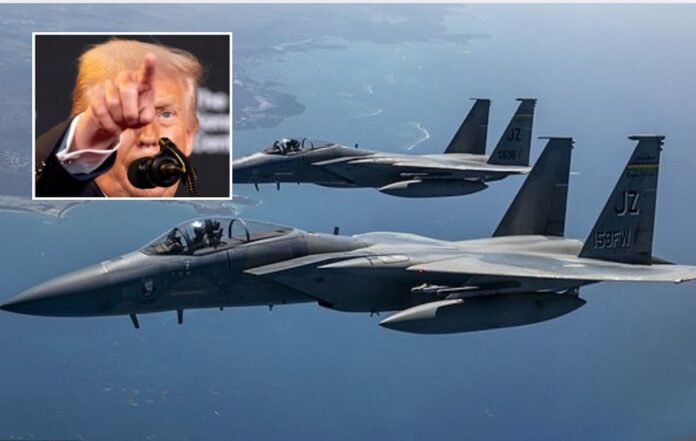- The US has deployed spy planes, a warship, and a submarine to the Southern Caribbean. This is to counter Latin American drug cartels.
- Several cartels, including MS-13 and Cartel de los Soles, have been designated as terrorist organizations. This expands US military and intelligence options.
- Experts warn the move could violate international law and strain diplomatic relations, particularly with Mexico.
The United States is dramatically ramping up its military presence in the Southern Caribbean, sending spy planes, a warship, and even a submarine into the region. This is in response to what officials describe as a growing threat from Latin American drug cartels. The move underscores a broader strategy by the Trump administration. They aim to confront organized crime with military power, which marks a notable escalation in the fight against narcotics trafficking.
Two sources familiar with the Pentagon’s plans confirmed to Reuters that the deployment follows last week’s presidential directive. This directive ordered military options in the Caribbean. “This deployment is aimed at addressing threats to U.S. national security. These threats come from specially designated narco-terrorist organizations in the region,” one source explained.
The White House has consistently framed drug cartels not just as criminal gangs but as organizations posing a broader national security risk. Earlier this year, the State Department labeled several notorious groups—including Mara Salvatrucha (MS-13) and Venezuela’s Tren de Aragua—as foreign terrorist organizations. In July, the Cartel de los Soles, which U.S. officials say is controlled by Venezuelan President Nicolás Maduro and his inner circle, was added to the list. The Treasury Department has accused the cartel of supporting other networks, such as Mexico’s Sinaloa Cartel, describing their operations as a direct threat to the United States.
Trump’s Military Approach to Drug Trafficking
President Trump has long sought to tackle drug trafficking with military force. During his campaign, he repeatedly promised to use all available tools. His goal is to dismantle drug networks that he views as a global threat. Over the past year, the U.S. has already increased airborne surveillance over Mexico. They have also deployed at least two warships to help monitor drug trafficking in the region.
Trump has even publicly offered to send U.S. troops into Mexico to combat the cartels. The Mexican government has firmly rejected this proposal. President Claudia Sheinbaum stated unequivocally that Mexico will not allow U.S. military forces on its soil. The refusal highlights a delicate balance the U.S. faces in taking unilateral action, raising questions about sovereignty and international law.
Secretary of State Marco Rubio has been outspoken in defending the administration’s approach. He described Nicolás Maduro’s government as illegitimate. Rubio accused it of using Venezuelan institutions to facilitate the Cartel de los Soles’ drug operations into the United States. Rubio emphasized that treating these groups as traditional street gangs is no longer sufficient. “They have weaponry that rivals armies in some cases,” he said. “What they are doing is a form of terrorism, and it goes far beyond simple drug dealing.”
Legal and Diplomatic Concerns
While the administration frames these moves as a necessary security measure, legal experts warn that unilateral military action in foreign countries could carry significant legal risks. Brian Finucane, senior advisor to the International Crisis Group and former legal counsel at the State Department, told the Daily Mail that drone strikes or military raids against cartel members outside the United States could violate the United Nations charter and U.S. law governing assassinations.
“To the extent that the U.S. military would detain individuals, serious questions arise about legal authority and due process,” Finucane said. “Detainees captured outside the civilian justice system would fall into a grey area of international and domestic law.”
Brandon Buck, a foreign policy researcher at the Cato Institute, echoed these concerns. He pointed out that unlike the U.S. military campaigns in the Middle East, there is no longstanding congressional authorization for military operations in Mexico or other parts of Latin America. “Trump may find himself on shaky legal ground,” Buck warned. “This could create major diplomatic tensions with Mexico and other regional allies.”
Public Reaction and Regional Tensions
News of the deployment has sparked mixed reactions across the region. In Mexico, officials and citizens alike have expressed deep concern about potential U.S. intervention. Many fear that even limited military actions could escalate into broader conflict, further straining relations between the two nations. Social media users in Mexico criticized Trump’s proposals, describing them as reckless and disrespectful of national sovereignty.
In the United States, the move has also drawn divided opinions. Supporters praise the administration’s hardline stance against drug trafficking, framing it as necessary to protect American communities from cartel violence. Others, however, worry that deploying military assets abroad could trigger unintended consequences, potentially leading to international incidents or civilian casualties.
The Strategic Implications
Military analysts note that deploying spy planes, warships, and a submarine signals a serious commitment by the United States. This aims to gather intelligence and disrupt cartel operations. Airborne surveillance has been a key component of the administration’s strategy. It provides real-time data on cartel movements, drug shipments, and operational hubs. The addition of naval forces and a submarine increases the U.S. ability to interdict smuggling routes. It also helps conduct targeted operations in international waters.
However, experts caution that these measures alone may not dismantle sophisticated criminal networks. Drug cartels are deeply entrenched in local economies and often have extensive political connections. Effective countermeasures, analysts say, require a combination of law enforcement, intelligence-sharing, regional cooperation, and long-term economic initiatives.




